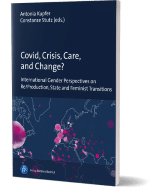 New with Budrich:
New with Budrich:
About the book
The Covid-19 crisis has intensified already existing social inequalities in different spheres. The authors examine how fundamental and sustainable the social changes over the course of the corona pandemic are at the social levels of labour, care work and state regulation in their gender dimensions.
Dear Antonia Kupfer and Constanze Stutz, with your anthology, you look at inequalities and how they were intensified by the Covid-19 pandemic. What dimensions does the book deal with – what kind of contributions does the book contain?
Our anthology analyses the intensification of gender hierarchies as a consequence of the Covid-19 pandemic. Gender hierarchies are one of the three classic categories of social inequality among class and ethnicity/”race”. Since about the 1960s many more inequalities such as single parenthood, differences in rural and urban living conditions, sexual preferences etc. gained publicity through struggles of various social movements around the world. This edited volume deals with three dimensions of gender hierarchies in times of Covid-19 pandemic: production and paid work (mainly in essential jobs such as cleaning), reproduction and unpaid work (e.g. homeschooling) and state regulations linked to the pandemic enabling a comparison among nations. All chapters are either theoretical and/or theoretically informed empirical studies. The book covers investigations from Albania, Austria, Brazil, Germany, Ghana and India. Furthermore, several chapters offer global data.
Did the publication of the book come out of a specific motivation?
In the summer of 2020, we started working on the call for a conference entitled ‘Covid, Crisis, Care and Change?’ which would focus on scientific findings regarding peoples’ power and ability to resist, shape and create the structures that form their everyday worlds even in times of crisis. Despite all ambivalences, we believed that there is potential for fundamental social change through the Covid-19 crisis. We saw evidence for this in widespread public discussions of the vast and unmistakable social inequality present across the globe, which took place to an extent unthinkable a couple of months earlier. But as social and political developments have shown, we were wrong in this assessment: Despite initial appearances and hopes, democratic-capitalist industrialized countries and their patriarchal structures have not been gravely undermined by the Covid-19 pandemic. The Covid-19 crisis has intensified already existing social inequalities in different spheres. With our anthology we wanted to examine how fundamental and sustainable the social changes over the course of the Covid-19 pandemic are at the social levels of labour, care work and state regulation in their gender dimensions and also map ways of possible feminist transformation.
The gender backlash caused by the pandemic has been widely discussed. What findings does the book add to that debate?
First, the anthology delves into and differentiates the debate about the gender backlash in the wake of the pandemic. From transnational perspectives scholars from various countries examine responses to the global pandemic in the areas of labour and production, care work and state regulations in their gender dimensions. Gundula Ludwig shows for example how the gendered architecture of the state in Austria is a key factor in turning a health crisis (Covid-19) into a comprehensive social crisis accompanied by an increase in social inequality, violence and exclusion.
Secondly, papers of our anthology ask about the global context of the pandemic. How did different states respond to the global Covid-19 pandemic and how did they regulate the crisis of social reproduction to keep capitalism on the move (paper by Ania Plomien, Alexandra Scheele and Martina Sproll)?
To widen perspectives on possible feminist transformations, the volume concludes with two chapters on the democratic value of spending time together and face masks as Witnessing Fabrics.
In your introduction, you write that, unlike other socioeconomic crises, the Covid-19 crisis exposed many people’s fundamental vulnerabilities. Has this contributed to a significant change in public or political awareness?
Initially, feminists and other left-wing people were optimistic that this crisis would be one leading to social change. Covid-19 consequences simply could not conceal increasing social inequalities existing before the pandemic as other crisis did – was a hope many people shared. But very quickly, this hope vanished, and it became obvious that states – differently – aimed at maintaining social structure and inequalities. Especially relying on unpaid care work, mainly done by women, to continue and keep the capitalist system running triggered a huge disillusion. However, our anthology contains chapters indicating it doesn’t have to end this way. There are ideas for feminist transitions.
This is why we have chosen Barbara Budrich as our publishing partner:
Barbara Budrich publisher is a long publishing partner since Femina Politica, the sole feminist journal in political sciences in German is published in your house. So, when we were searching a fitting publisher we could rely on a long period of very fruitful cooperation. Additionally, Budrich is one of the publishers that offers profound gender research. Finally, yet importantly, Budrich has offices in the USA and in Germany and is well connected globally.
Short vitae of the editors

Antonia Kupfer is professor of Macrosociology at Technical University Dresden since October 2014. She has been Senior Lecturer at the School of Education, Southampton University, UK and Schumpeter Fellow at Weatherhead Center for International Affairs, Harvard University, USA. Her research interests are social inequality, gender relations, class, power.

Constanze Stutz is a researcher and lecturer at the Institute for Sociology, Technical University Dresden. Her research interests are Feminist Theory, Gender and Queer Studies as well as Social movement and transformation re-search. Currently, she is working on her doctoral dissertation in which she analyses concepts of gender, emancipation and work in the biographical narratives of the German post-reunification generation.
 Order now via our shop
Order now via our shop
edited by Antonia Kupfer und Constanze Stutz

